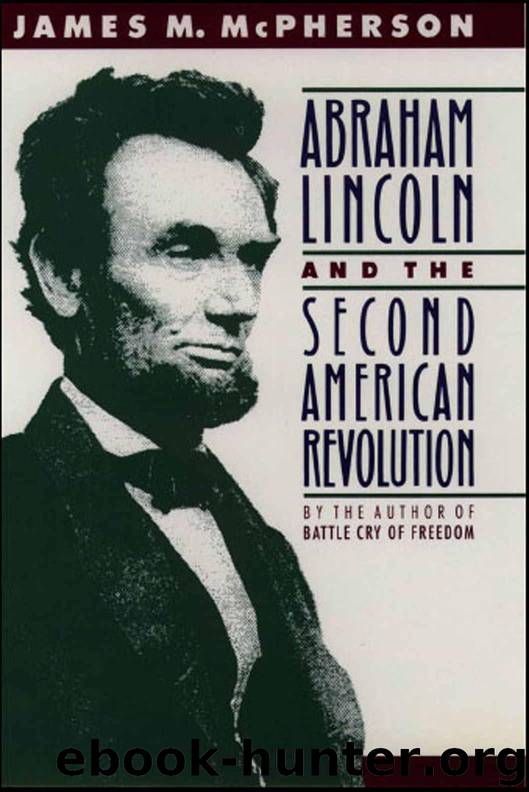Abraham Lincoln and the Second American Revolution by James M. McPherson

Author:James M. McPherson [McPherson, James M.]
Language: eng
Format: epub
Publisher: Oxford University Press
Published: 1992-06-04T06:00:00+00:00
V How Lincoln Won the War with Metaphors
In an essay on the reasons for Confederate defeat in the Civil War, southern historian David M. Potter made a striking assertion: “If the Union and Confederacy had exchanged presidents with one another, the Confederacy might have won its independence.” Is this rather dramatic conclusion justified? Most historians would probably agree with Potter’s general point that Davis’s shortcomings as a leader played a role in Confederate defeat. They would also agree that one of Davis’s principal failures was an inability to communicate effectively with other Confederate leaders and with the southern people. As Potter put it, Davis “seemed to think in abstractions and to speak in platitudes.”1
Lincoln, by contrast, most emphatically did not think in abstractions and rarely spoke in platitudes. We have not had another president—except perhaps Franklin D. Roosevelt— who expressed himself in such a clear, forceful, logical manner as Lincoln. It is no coincidence that Lincoln and Roosevelt were great war presidents who led the United States to its most decisive victories in its most important wars. Their pre-eminent quality as leaders was an ability to communicate the meaning and purpose of these wars in an intelligible, inspiring manner that helped energize and mobilize their people to make the sacrifices necessary for victory. By contrast, Jefferson Davis, as another historian has concluded, failed to do a good job “in eliciting the enthusiasm and energies of the people.”2
Wherein lay Lincoln’s advantage over Davis in this matter? It certainly did not derive from a better education. Davis had received one of the best educations that money could buy in his day. He attended one “college” in Kentucky and another in Mississippi, which were really secondary schools or academies; he went to Transylvania University in Kentucky, which was one of the best genuine colleges west of the Appalachians at that time; and he graduated from the military academy at West Point, the best American school for engineering as well as for military science in that era. From his education Davis acquired excellent training in the classics, in rhetoric, logic, literature, and science. He should have been a superb communicator. And in many respects he was, by the standards of the time. He could write with vigorous logic, turn a classical phrase, quote the leading authorities on many a subject, and close with a rhetorical flourish.
Lincoln had only a year or so of formal schooling in the typical rote-learning “blab schools” of the day, schooling that he obtained, as he later put it, “by littles”—a month here, a couple of months there, spread out over a period of a few years. Lincoln was basically a self-taught man. Of course he later read law, which along with the practice of that profession helped to give him an ability to write and speak with clarity, a skill in logical analysis, and a knack for finding exactly the right word or phrase to express his meaning. But Jefferson Davis also possessed most of these skills of expository writing and speaking.
Download
This site does not store any files on its server. We only index and link to content provided by other sites. Please contact the content providers to delete copyright contents if any and email us, we'll remove relevant links or contents immediately.
| African American | Asian American |
| Classics | Anthologies |
| Drama | Hispanic |
| Humor | Native American |
| Poetry | Southern |
Crazy Rich Asians by Kevin Kwan(9274)
How to Bang a Billionaire by Alexis Hall(8144)
Giovanni's Room by James Baldwin(7320)
Win Bigly by Scott Adams(7183)
Little Fires Everywhere by Celeste Ng(7183)
Pachinko by Min Jin Lee(5679)
Tease (Temptation Series Book 4) by Ella Frank(5626)
The Fire Next Time by James Baldwin(5429)
The Perks of Being a Wallflower by Stephen Chbosky(4633)
China Rich Girlfriend by Kwan Kevin(4557)
Bluets by Maggie Nelson(4544)
First Position by Melissa Brayden(4518)
The Sympathizer by Viet Thanh Nguyen(4384)
Rich People Problems by Kevin Kwan(4282)
A Little Life (2015) by Hanya Yanagihara(4275)
Right Here, Right Now by Georgia Beers(4196)
Walking by Henry David Thoreau(3950)
Catherine Anderson - Comanche 03 by Indigo Blue(3619)
The Death of the Heart by Elizabeth Bowen(3605)
